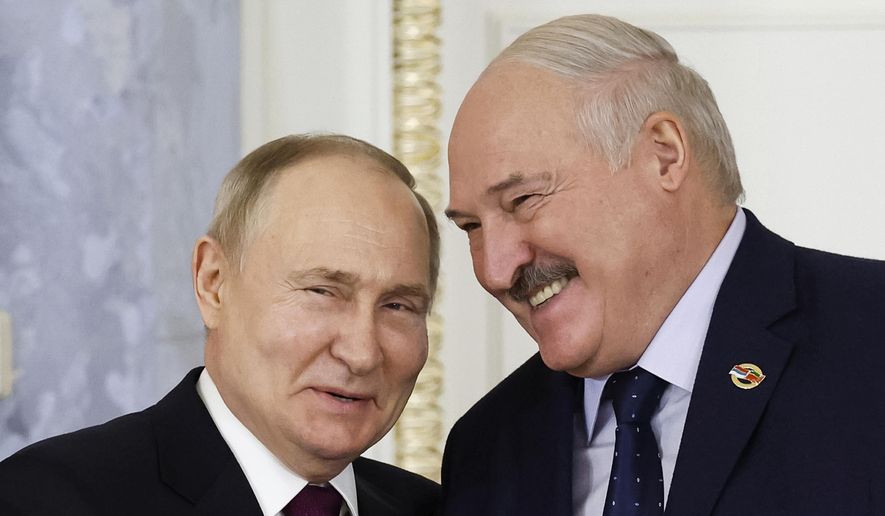Belarusian President Alexander Lukashenko said he wants to repair relations with the West to end years of international isolation and sanctions imposed on his country’s weakened economy.
He freed dozens of political prisoners in September as part of a U.S.-brokered deal that lifted some sanctions on the country’s national airline.
Despite his friendly overtures to the West, Belarus remains little more than a Russian satellite, according to a new study from the Atlantic Council think tank.
“From the start of his presidency in 1994, Lukashenko aligned himself with Moscow, consolidating domestic power by dismantling democratic institutions and suppressing dissent,” according to “Minsk in Moscow’s grip: How Russia Subjugated Belarus Without Annexations.” “He courted Russian elites and even positioned himself in the 1990s as a possible successor to President Boris Yeltsin, garnering the support of some nationalists in Russia.”
Despite opposition from Belarusian citizens, many of whom support independence from Moscow, analysts said Russia has absorbed Mr. Lukashenko’s government, with Belarus essentially becoming a military outpost of the Kremlin.
At least 2,000 Russian troops are believed to be based in Belarus, which is just to the west of Europe’s largest country.
“Belarus allowed Russian troops to attack Ukraine from its territory in February 2022. Lukashenko did not send his own soldiers, but he helped in every other way,” Hanna Liubakova, who wrote the report, said Thursday in a discussion hosted by the Atlantic Council. “He enabled, basically, the invasion. Russia had full access to Belarusian airfields, railways, roads and even oil refineries. Wounded Russian soldiers, including war criminals, were treated at Belarusian hospitals.”
Belarus relinquished its nuclear weapons following the collapse of the Soviet Union in 1991 and signed the Nuclear Non-Proliferation Treaty. The country held a February 2022 constitutional referendum that Ms. Liubakova described as “fake, false” that renounced its nuclear-free status.
Afterward, Moscow deployed nuclear-capable Iskander missiles to Belarus.
“Potential deployment of Russian nukes in Belarus does not change much on the battlefield, but this move is meant to unsettle neighbors,” Ms. Liubakova said. “If Belarus becomes a nuclear base, the country also becomes a target for potential retaliation in the future.”
She noted that while nuclear missiles may be located in Belarus, they would be under Russian control.
“Belarus continues to be used for military purposes by Russia. The military in Belarus is not just Russia’s army; it’s part of Russia — Russia’s military machine,” Ms. Liubakova said.
The economy is another sphere that demonstrates Belarus’s dependence on Moscow. Belarus owes about $8 billion to Russia, making it the Kremlin’s largest debtor. At least 70% of the country’s trade goes to Russia, and the Kremlin oversees Belarus’ ports and railways.
“Moscow effectively controls more than 19% of Belarus’ outbound trade because of the western routes being closed,” Ms. Liubakova said.
She said Minsk, Belarus’ capital, has become deeply intertwined with Russia’s military supply chain. More than 280 state enterprises are supporting Russia’s war machine, delivering whatever it asks for, from sophisticated electronics to artillery shells.
Despite the overwhelming Russian control, analysts say Belarus continues angling for friendly attention from other countries, including China and the U.S.
On Sunday, President Trump announced the nomination of lawyer John Coale as Washington’s special envoy to Minsk, citing his work on the deal that resulted in the prisoner releases.
“He has already successfully negotiated the release of 100 hostages, and is going for an additional 50,” Mr. Trump said on social media while offering thanks to the “highly respected” leader of Belarus.
Ms. Liubakova agreed that Belarus wants to be less isolated from the West and for Washington to lift sanctions. Minsk is even willing to release more prisoners as a “humanitarian gesture.”
“But without real change and the end of repression, this could become a never-ending story or worse, even a cynical business model,” she said. “Because Lukashenko could get even more hostages and even more prisoners.”
• Mike Glenn can be reached at mglenn@washingtontimes.com.




Please read our comment policy before commenting.